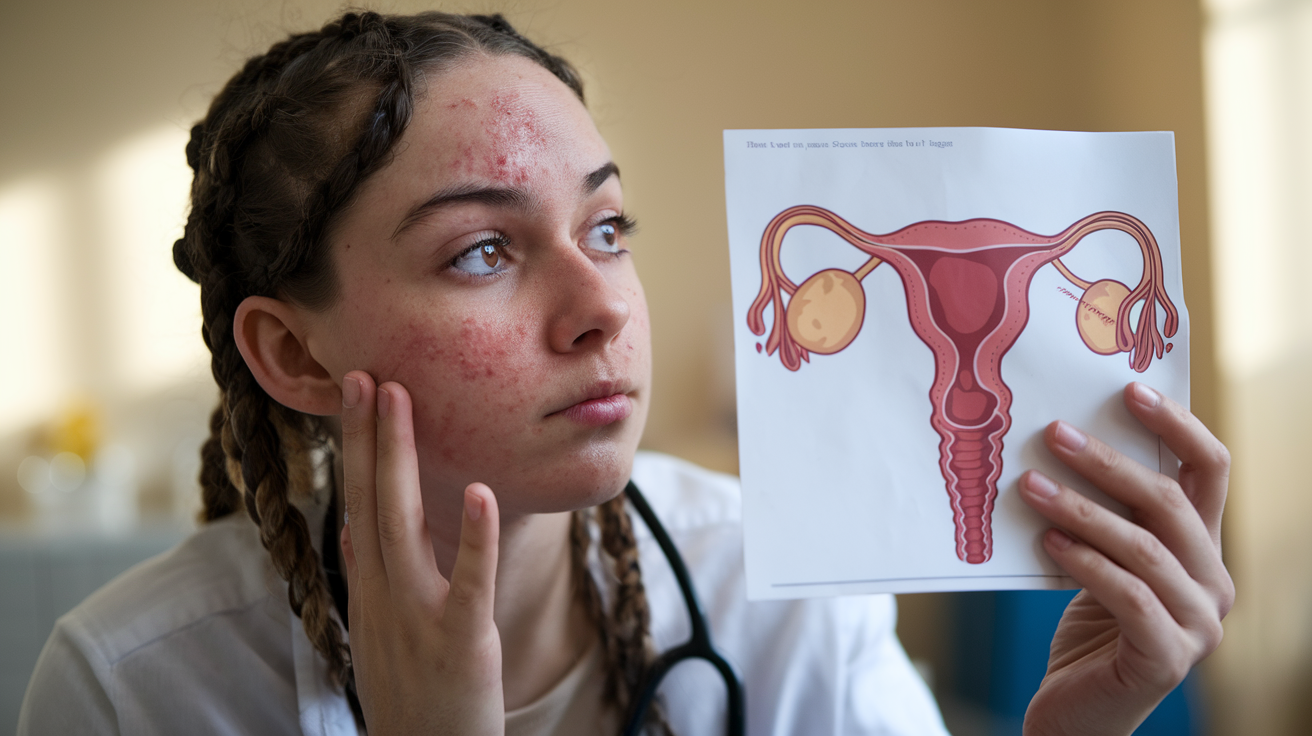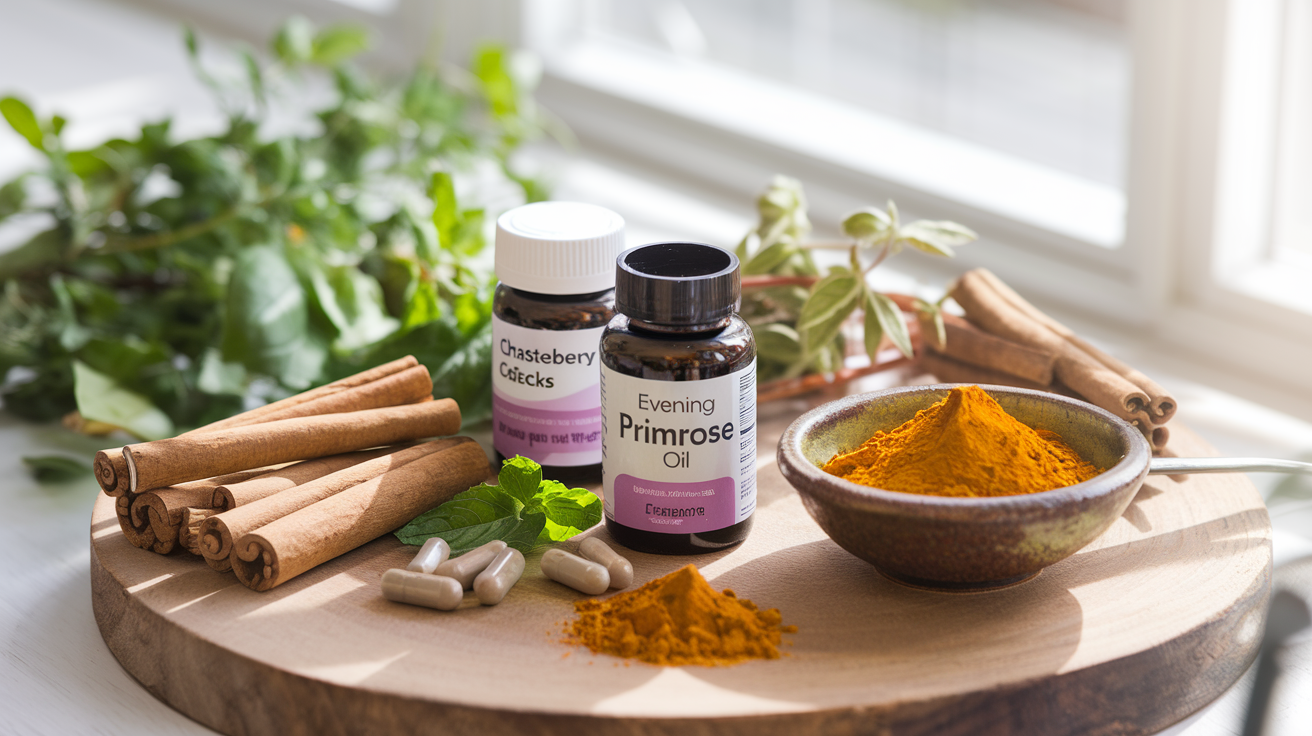Ever jumped from one PCOS “miracle cure” to another, only to feel like you're chasing your own tail? You're not alone. Nearly 1 in 10 women worldwide are right there with you, battling polycystic ovary syndrome's unpredictable mood swings, stubborn weight gain, and those lovely surprise chin hairs.
Look, managing PCOS symptoms naturally isn't about overhauling your entire life overnight. It's about finding sustainable changes that actually work for your body.
I've spent years researching natural ways to manage PCOS symptoms, testing what works and what's just expensive snake oil. The seven approaches I'm about to share have genuine science behind them – no crystals or mysterious $80 powders required.
But first, let's talk about the one thing most doctors completely overlook when treating PCOS…
Understanding PCOS and Its Impact on Your Body

A. What is PCOS and how it affects hormone levels
PCOS isn't just another health acronym – it's a reality affecting about 1 in 10 women. Polycystic Ovary Syndrome throws your hormones into chaos. Your ovaries start producing too much testosterone (yes, women naturally have some), while insulin levels often spike too.
Picture your hormones as a delicate symphony. With PCOS, it's like someone cranked up the bass and muted the violins. Your body produces excess androgens (male hormones), which messes with egg development and release during your cycle.
B. Common symptoms and their underlying causes
The hormonal storm of PCOS creates a wide range of symptoms that can be downright frustrating:
- Irregular periods (or none at all) – thanks to disrupted ovulation
- Stubborn weight gain, especially around your middle – blame insulin resistance
- Acne and oily skin – excess androgens strike again
- Unwanted hair growth on face and body – those pesky male hormones
- Hair thinning on your head – the cruel irony of PCOS
- Dark skin patches – insulin resistance leaving its mark
C. Why natural approaches can complement medical treatments
While medications like birth control and metformin help many women with PCOS, natural approaches can be powerful allies. Your body responds to lifestyle changes in profound ways.
Anti-inflammatory diets reduce the internal fire that worsens PCOS symptoms. Regular movement – even just walking – dramatically improves how your cells respond to insulin. Stress management isn't fluff – it directly impacts your hormone pathways.
Natural doesn't mean rejecting conventional treatment. Think of it as strengthening your foundation while medications help rebalance your biochemistry. The most successful PCOS management often combines both worlds.
Anti-Inflammatory Diet Changes That Reduce PCOS Symptoms

Foods that fight inflammation and balance hormones
The PCOS struggle is real, and what you eat matters more than you might think. Your body is literally begging for anti-inflammatory foods that can help tame those hormonal wildfires.
Start with colorful veggies like kale, spinach, and bell peppers – they're packed with antioxidants that fight inflammation at its source. Berries aren't just delicious; they're inflammation-fighting powerhouses too.
Healthy fats are your new best friends. Avocados, olive oil, and fatty fish like salmon contain omega-3s that reduce inflammation and support hormone production. And don't skip those walnuts and chia seeds – they're hormone-balancing gold.
Simple meal planning for steady blood sugar
Blood sugar spikes are PCOS's partner in crime. The fix? Pair proteins with complex carbs at every meal.
Morning oatmeal? Add some almond butter. Lunchtime salad? Top it with grilled chicken or chickpeas. This simple pairing trick slows digestion and prevents those energy crashes that trigger cravings.
Meal prep isn't just trendy – it's your secret weapon. When hunger strikes and you've got nothing planned, that's when pizza delivery sounds too good to resist.
Key nutrients that support reproductive health
Certain nutrients are must-haves for managing PCOS naturally:
- Magnesium (dark chocolate, anyone?)
- Vitamin D (the sunshine vitamin)
- Zinc (pumpkin seeds are loaded with it)
- B vitamins (especially folate from leafy greens)
Foods to avoid that may worsen symptoms
Sorry to be the bearer of bad news, but these inflammatory troublemakers need to go:
- Processed foods with artificial ingredients
- Refined carbs that spike blood sugar
- Excessive dairy (especially non-organic)
- Alcohol (it messes with liver function and hormone processing)
The occasional treat won't derail everything, but making these changes consistently can dramatically reduce your symptoms over time.
Regular Exercise Routines That Balance Hormones

Best types of exercise for insulin resistance
When it comes to PCOS, insulin resistance is often the elephant in the room. Working out isn't just about losing weight – it's about fixing how your body processes sugar.
HIIT (High-Intensity Interval Training) is your new best friend. Just 20 minutes of alternating between pushing hard and recovery periods can dramatically improve insulin sensitivity. Think sprint for 30 seconds, walk for 90 seconds, repeat.
Moderate cardio also works wonders – a 30-minute brisk walk after meals can lower blood sugar spikes by up to 30%. The key is consistency, not intensity.
Swimming deserves special mention for women with PCOS. It's gentle on your joints while providing full-body resistance that helps your muscles use glucose more efficiently.
How strength training improves PCOS symptoms
Strength training isn't just for bodybuilders. For PCOS warriors, it's medicine.
When you lift weights, you build muscle that acts like a glucose sponge, soaking up excess sugar from your bloodstream. More muscle means better insulin function, period.
Plus, resistance training reduces testosterone levels in women with PCOS (yes, really). One study showed a 25% drop after just 12 weeks of consistent strength work.
Creating a sustainable workout schedule
The perfect workout plan is the one you'll actually do. Start small – even 10 minutes counts.
Try this beginner-friendly weekly template:
- Monday: 20-min HIIT
- Wednesday: 30-min strength training (focus on major muscle groups)
- Friday: 20-min HIIT
- Daily: 15-min walk after dinner
Remember, hormone balancing exercises work best when they don't stress your body further. Listen to your energy levels and adjust accordingly.
Stress Management Techniques for Hormone Balance

A. The connection between stress and PCOS symptoms
Ever wonder why your PCOS symptoms flare up during stressful periods? That's not a coincidence.
When stress hits, your body pumps out cortisol—the infamous stress hormone. For women with PCOS, this cortisol spike can throw your already-sensitive hormone balance completely out of whack. Your insulin levels rise, testosterone production increases, and boom—suddenly you're dealing with worse acne, irregular periods, and stubborn weight gain.
It's a vicious cycle too. PCOS causes stress, which worsens PCOS symptoms, which causes more stress. Breaking this cycle is essential for holistic PCOS management.
B. Mindfulness practices that reduce cortisol levels
Meditation isn't just for yogis. Research shows just 10 minutes daily can significantly lower cortisol levels for women with PCOS.
Try this: Sit comfortably, close your eyes, and focus on your breath for 10 minutes. When thoughts pop up (and they will), just notice them and return to your breathing. Nothing fancy required.
Other powerful practices:
- Body scan meditation
- Guided imagery
- Nature walks without your phone
- Journaling before bed
C. Breathing exercises for immediate symptom relief
When PCOS anxiety strikes, your breath is your emergency toolkit.
The 4-7-8 technique works wonders:
- Inhale quietly through your nose for 4 counts
- Hold your breath for 7 counts
- Exhale completely through your mouth for 8 counts
- Repeat 4 times
This technique triggers your parasympathetic nervous system, instantly calming hormonal fluctuations.
D. Establishing healthy sleep patterns
Poor sleep and PCOS are terrible roommates. Lack of sleep spikes cortisol, worsens insulin resistance, and increases food cravings.
Create your sleep sanctuary:
- No screens 1 hour before bed (seriously)
- Keep your bedroom cool (65-68°F is ideal)
- Develop a calming bedtime ritual
- Try to sleep and wake at consistent times
Prioritizing sleep isn't lazy—it's essential stress management for hormonal balance and natural treatment for PCOS symptoms.
Herbal Supplements and Natural Remedies

Evidence-based herbs that regulate menstrual cycles
Living with irregular periods? You're not alone. Many women with PCOS struggle with unpredictable cycles, but certain herbs have shown real promise in bringing balance back.
Chasteberry (Vitex) stands out as a game-changer. It works directly on your pituitary gland to regulate prolactin levels and boost progesterone. Most women notice improvements within 3-6 months of consistent use.
Cinnamon isn't just for your latte. Studies show it can reduce menstrual pain and regulate cycles in women with PCOS. Just half a teaspoon daily can make a difference.
Don't overlook licorice root. This powerful herb helps moderate testosterone levels and can reduce the number of days between periods for women with irregular cycles.
Supplements that improve insulin sensitivity
Insulin resistance is practically PCOS's middle name. These supplements can help break that frustrating cycle:
Inositol (particularly myo-inositol) is the superstar here. It improves how your cells respond to insulin and can restore ovulation in many women with PCOS. The sweet bonus? It often helps with cravings too.
Chromium works behind the scenes to make insulin more effective. Even 200mcg daily can improve blood sugar control.
Berberine performs nearly as well as metformin (a common PCOS medication) in studies, but comes from plants rather than a lab.
Natural anti-androgens for skin and hair symptoms
Those annoying symptoms like acne and unwanted hair? They're typically driven by high androgens, but these natural options can help:
Spearmint tea works as a natural anti-androgen. Drinking 2 cups daily has been shown to reduce testosterone levels and improve hirsutism in women with PCOS.
Saw palmetto blocks the conversion of testosterone to its more potent form, helping with both hair loss on your head and unwanted hair elsewhere.
Green tea extract contains powerful antioxidants that reduce inflammation and help lower androgen levels when consumed regularly.
Maintaining Healthy Weight Without Extreme Dieting

Why Weight Management Helps with PCOS
Weight and PCOS have a complicated relationship. Carrying extra weight can make PCOS symptoms worse, while PCOS itself makes losing weight harder. Talk about a frustrating cycle!
When you manage your weight, insulin resistance (a common PCOS problem) improves. Your body becomes more sensitive to insulin, which helps balance hormones and can even restart regular periods. Many women find their androgen levels drop too, which means less unwanted hair growth and acne.
But here's something not everyone realizes: even a modest 5-10% weight reduction can dramatically improve symptoms. You don't need to reach some “ideal” weight to start feeling better.
Sustainable Approaches to Reaching Optimal Weight
Crash diets are your enemy with PCOS. Your body needs consistent, gentle approaches:
- Anti-inflammatory eating: Focus on whole foods like colorful veggies, lean proteins, and healthy fats while minimizing processed foods and added sugars
- Regular, enjoyable movement: Find exercise you actually like doing – walking, swimming, dancing – whatever doesn't feel like punishment
- Balanced meals: Include protein, fiber, and healthy fats at each meal to keep blood sugar stable
How to Overcome PCOS-Related Weight Loss Challenges
PCOS makes weight loss tougher, but not impossible. Try these strategies:
- Eat for blood sugar balance: Small, frequent meals prevent insulin spikes
- Strength training: Building muscle improves insulin sensitivity
- Track non-scale victories: Energy levels, sleep quality, and mood improvements matter more than numbers
- Consider working with specialists: Nutritionists who understand PCOS can create personalized plans
- Be patient with yourself: Progress might be slower than for others, but it's still progress
Acupuncture and Alternative Therapies

How Acupuncture Affects Hormone Regulation
Struggling with PCOS hormone chaos? Acupuncture might be your unexpected ally. This ancient practice targets specific points on your body that directly influence hormone production and regulation.
When those tiny needles hit the right spots, they can actually help lower testosterone levels and improve insulin sensitivity – two major issues for PCOS warriors. Many women report more regular periods after several sessions.
What makes acupuncture work? It boosts blood flow to your reproductive organs and triggers endorphin release, which can ease stress (a known hormone disruptor).
Benefits of Massage for Symptom Management
Massage isn't just a luxury – it's medicine for PCOS bodies. Regular therapeutic massage reduces cortisol (that pesky stress hormone that makes PCOS worse) while increasing feel-good hormones like serotonin and dopamine.
Abdominal massage specifically helps with bloating and cramping, common PCOS complaints. Deep tissue work improves circulation to your ovaries and uterus, potentially easing pain and inflammation.
Essential Oils That May Help Balance Hormones
Certain essential oils pack surprising hormone-balancing power:
- Clary sage: The PCOS superstar that may reduce cortisol and boost estrogen
- Lavender: Helps tame stress and supports sleep quality
- Thyme: Contains compounds that mimic progesterone effects
- Sandalwood: May help regulate testosterone levels
Apply diluted oils to pulse points or diffuse them during meditation for maximum benefit.
When to Consider Alternative Treatments Alongside Conventional Medicine
Alternative therapies work best as companions to conventional care, not replacements. Consider adding them when:
- You've got your doctor's baseline treatment plan but still battle symptoms
- Side effects from medications are challenging
- You need support managing stress and inflammation
- You want to address multiple symptoms holistically
Always keep your healthcare provider in the loop about any alternative treatments you're trying. The most successful PCOS management typically combines both approaches for truly personalized care.

Conclusion
Living with PCOS doesn't mean you have to rely solely on medication. The seven natural approaches outlined—from adopting an anti-inflammatory diet to exploring alternative therapies like acupuncture—offer effective ways to manage your symptoms and improve your quality of life. Regular exercise, stress management, and maintaining a healthy weight work together to create a holistic treatment plan that addresses the root causes of hormonal imbalance.
Remember that every woman's PCOS journey is unique. Consider working with healthcare providers who respect your preference for natural solutions while providing appropriate medical oversight. By incorporating these strategies into your daily routine and remaining consistent, you can take control of your PCOS symptoms and experience significant improvements in your overall well-being.
Special Diet Cookbooks
Affiliate Disclosure: This article contains affiliate links. If you click and purchase, I may earn a small commission at no extra cost. This helps support content creation while providing you with trusted product recommendations.

